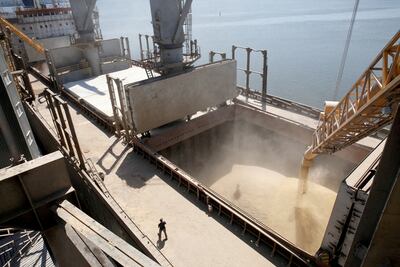The Ukraine war is stifling trade and logistics in the Black Sea region, increasing global vessel demand and the cost of shipping around the world, a new report by the UN has said.
Disruptions in regional logistics, the halting of port operations in Ukraine, destruction of important infrastructure, trade restrictions, increased insurance costs and higher fuel prices have all led to shipping hurdles in the region, the UN Conference on Trade and Development (Unctad) said.
Shipping distances have increased, along with transit times and costs, as Ukraine's trading partners now have to source commodities from farther away.
"Grains are of particular concern given the leading role of the Russian Federation and Ukraine in agrifood markets, and its nexus to food security and poverty reduction," the report said.
Between February and May 2022, the price of transporting dry bulk goods — such as grains — increased by nearly 60 per cent, Unctad said.
The increase in grain prices and freight rates could lead to a nearly 4 per cent increase in consumer food prices globally. Almost half of this impact is due to higher shipping costs, the report said.
Russia and Ukraine are prominent players in agrifood markets, including animal feed. Together, they account for 53 per cent of global trade in sunflower oil and seeds, and 27 per cent of wheat, figures compiled by Unctad show.
A total of 36 countries import more than 50 per cent of their wheat from Russia and Ukraine alone.
Before the war, estimates projected a growth of 3 per cent in global sea exports of grain. Now, however, they are projected to shrink by 3.8 per cent in 2022.
Russia is also a major player in the global market for crude oil and fertiliser, both of which are key inputs for farmers worldwide.
Disruptions in their supply can lead to lower grain yields and higher prices, with serious consequences for global food security, particularly in vulnerable and food-import dependent economies, the Unctad warned.
Global shipments of fertiliser and its inputs such as potash are projected to drop by 7 per cent in 2022, it said.
The Russia-Ukraine conflict will keep food and energy prices at “historically high levels” until 2024, the World Bank said last month.

Middle-income economies are expected to experience slightly higher food price increases as their imports depend on dry bulk shipping more than the global average, Unctad said.
The impact of the dry bulk freight rate surge on low-income economies is expected to be smaller as their food imports are concentrated on processed rather than primary food products, partly because of their low capacity to process food.
The Russia-Ukraine war has also led to higher energy costs, which in turn have caused marine bunker prices to rise, increasing shipping costs for all sectors.
By the end of May 2022, the global average price for very low sulphur fuel oil (VLSFO) reached more than $1,000 per tonne, a 64 per cent increase compared to the start of the year, with average fuel surcharges charged by container shipping lines up close to 50 per cent since the beginning of the war, Unctad said.
"Taken altogether, these increased costs imply higher prices for consumers and threaten to widen the poverty gap," the report said.
_______________________
Russia-Ukraine conflict - in pictures
_______________________
Policy action is required for global trade to flow more smoothly and for the maritime shipping sector to recover, the UN body said.
"There will be no effective solution to the food crisis without reintegrating Ukraine’s food production, as well as the food and fertiliser produced by the Russian Federation into world markets — despite the war," it said.
It recommended ensuring Ukrainian ports are open to international shipping to allow Ukrainian grain to reach overseas markets, at lower shipping costs.
The agency also called for measures to ease the movement of transport workers, albeit temporarily, to reduce pressure on cross-border trade and transit.
Governments should also invest in transport services, as well as trade and transit facilitation even more than in pre-war times, Unctad said.
It also urged support for developing countries, especially the most vulnerable economies, and net-importers of food.
"The war in Ukraine adds to the challenges posed by the Covid-19 pandemic and the climate crisis. The international community’s support is needed to provide financial and technical assistance related to transport and trade facilitation," Unctad said.






























